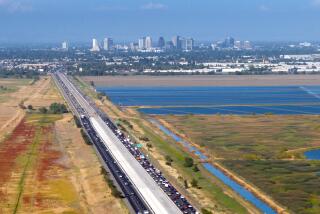Defense Firms See High-Tech Roads Ahead
- Share via
FULLERTON — From smart bombs to smart highways?
It might seem like a pipe dream, but Hughes Aircraft Co. researchers hope to use state-of-the-art defense technology--particularly advanced sensors and target identification systems used in “smart weapons”--to improve the nation’s snarled transportation system.
Like many other defense contractors facing drastic Pentagon budget cuts, Hughes wants to convert this technology for use in commercial markets.
Researchers at Hughes and elsewhere envision futuristic toll roads where drivers would whiz past automated toll collectors capable of reading electronic tags on each car. Freeway jams would be alleviated by using technologies such as video cameras that quickly report accidents or cellular-like radio systems that direct drivers to less-congested routes.
Cars would be outfitted with computers to help drivers navigate and sensors would sound alarms if traffic slowed or a collision is imminent. Infrared technology would make night-driving less hazardous, experts say.
“It’s a major market opportunity for us,” said Hughes Vice President Joseph Capobianco, who coordinates research on smart highways at Hughes’ sprawling plant in Fullerton. “The question is making it affordable.”
The need to ease traffic congestion won’t surprise many Southern Californians. By the year 2010, according to Caltrans estimates, traffic on the state’s highways will be creeping along at an average speed of 11 m.p.h., compared to about 35 m.p.h. in urban areas today.
Due to concerns about budget constraints, overdevelopment or damage to the environment, fewer highways are being built, so making better use of existing highways is paramount.
Hughes isn’t alone in surveying the market potential for smart highways. Scores of other companies such as Motorola, Rockwell and TRW are also looking into the field. UC Irvine and the Massachusetts Institute of Technology also have ongoing research projects, as does Caltrans.
U.S. and foreign car makers and highway engineers have formed their own association, the Intelligent Vehicle and Highway Society of America, to study the market and lobby Congress for funding.
The Washington-based trade group has estimated in a preliminary study that the market for highway-related technologies could reach $210 billion over the next 20 years. That figure assumes that the car of the 21st Century will be equipped with $1,500 worth of high-tech gadgetry as standard equipment.
That cost compares to, he notes, an estimated $100 billion in lost productivity annually because of traffic congestion, according to a report by the federal Department of Transportation. About 60% of the $210 billion would be funded by private sector investors who are building private toll roads.
The figure dwarfs the $130 billion that the federal and state governments spent during a 25-year period to build interstate highways, but it is just shy of this year’s defense budget.
The amount also includes transportation-related applications such as systems for tracking hazardous waste movement, automated gas stations, automated weigh stations for trucks and automatic collection for parking garages.
“We can’t build many roads anymore,” said Don Savitt, manager of Hughes’ traffic management systems program. “But we can apply Hughes technology to traffic management and improve the flow on freeways and arterials.”
Certainly, there are many issues to be solved. Some question whether the budget-strapped federal government will have the money to finance a massive overhaul of the highway system. And transportation experts wonder if automated highways will simply move traffic problems to the secondary roads where traffic is directed from highway accidents.
Further, there are those who question whether the public would stand for law-enforcement agencies using more sophisticated technologies to identify lawbreakers. Others wonder if consumers will pay for fancy gadgets in their cars that they may not use.
These concerns are causing many companies to proceed with caution. Rockwell, for example, is still “testing the waters” regarding high-tech transportation systems, said Jerry Ward, a staff member for advanced technology engineering at Rockwell’s facility in Anaheim. Ward expects research work to take about five more years “and the rest depends on how much federal funding there will be.”
In California, the greatest potential for such technology would be for automatically guiding cars on freeways, Ward said. The idea would be to squeeze as many as three times more cars on the same stretch of highway.
The Orange County Transportation Authority is developing a 20-year master plan for the development of “Intelligent Vehicle/Highway Systems” (or smart cars and highways) in the county under a $250,000 state grant. Dean Delgado, an OCTA analyst in Santa Ana, says it will be several years before any prototype contracts for such a system are awarded.
Thirty-six test projects are underway nationwide. But some high-tech and defense companies see potholes on the path toward sensor-strewn highways, citing state and federal budget constraints as the biggest problem.
Joel Slutzky, chief executive of Odetics Inc., is optimistic about the prospects of using the Anaheim company’s precision timing devices for more extensive synchronization of traffic signals in large cities. But he added: “A company like Hughes can wait around for the big transportation market to develop, but I think it’s a long way off.”
Because so much government red tape is involved, major transportation projects can take a decade or more from start to finish. So far Hughes has won about $10 million in research contracts for smart highways--a pittance for the giant technology firm with annual revenue of $7.7 billion.
Capobianco said Hughes is in the market for the long term; it first began research on high-tech highways in the 1950s. When General Motors Corp. acquired Hughes for $5.2 billion in 1985, it encouraged Hughes’ venture into transportation technologies.
GM has pursued its “smart car” technologies, while Hughes has focused on the “smart highways” technologies by converting some of its military technology, such as smart-bomb technology, for civilian use, Capobianco said. The research involves the Fullerton-based Ground Systems Group as well as other Hughes divisions.
Much of the company’s efforts involve development of computer software to be used for traffic management systems.
In Minnesota, Hughes was selected to be part of a consortium of investors who hope to build private toll roads in Minneapolis, said Robert Hentges, legislative counsel for the Minnesota Tollway Authority Inc.
“We hope to bid on a contract worth about $150 million in about a year,” he said.
Hughes is working with GM on an $8-million project known as TravTek in Orlando, Fla. GM has equipped 100 cars with two-way radios and other high-tech equipment. Hughes assists with the communications network and overall system. The system links drivers with a control center that gives them instant traffic information, provides navigational services and even suggests destinations such as motels.
In the past, Caltrans has traditionally depended upon hundreds of “detection loops,” or electronic detectors embedded in the pavement that with the help of a traffic computer tell traffic engineers how fast vehicles are moving.
But the detectors are costly and they fail 5% of the time. They also don’t tell Caltrans engineers what kind of vehicles are on the highway or whether a certain traffic tie-up means an accident has occurred.
In Orange County, the county’s three proposed toll roads could eventually use Hughes technology, but contract bidding for major work is probably several years away, Savitt said.
Under a $3-million state contract awarded earlier this month, UC Irvine’s Institute of Transportation Studies will monitor three locations in Southern California: the Santa Monica Freeway in Los Angeles County, the intersection of Harbor Boulevard and Katella Avenue near Disneyland in Anaheim, and a 10-mile area that includes the Costa Mesa, Santa Ana and San Diego freeways near Irvine.
“We’ll try to find out what works,” said Will Recker, director of the UCI project. “There is a lot of valid skepticism out there. I think we know we can reduce traffic problems, but we don’t know how much.”
These local efforts, increased federal spending and the planned construction of private toll roads across the nation have convinced Hughes’ Capobianco that the opportunities are worth pursuing.
In the $151-billion federal highway bill passed in October, Congress approved about $234 million for research on advanced transportation technologies such as smart corridors. The funding will increase in subsequent years, hitting $660 million by fiscal year 1997.
“We can get in line and see some of the peace dividend come our way,” Capobianco said.
Smart Cars Meet Smart Roads
Hughes Aircraft Co. is exploring how to use defense-related technology to help make roads and cars “smarter.” How a futuristic toll-collection system would work:
1. Car passes without stopping.
2. Roadside scanner reads electronic tag on dashboard or license plate that driver purchased in advance for a set amount.
3. Scanner transmits data to satellite.
4. Satellite relays data to traffic control center; computer charges driver’s account for toll amount; driver is notified when account balance is close to zero.
Driving into the Future
Other smart technology could include:
Driver warnings: If the cars ahead suddenly slow down, a sensor in the car sounds an alarm to alert the driver.
Buying gas: The same electronic tags used for toll collection are also used for buying gas or other service-station products.
Emergencies: If car breaks down in a remote area, the driver uses a two-way communications system to notify traffic engineers of problem and location. Engineers dispatch nearest emergency aid.
Source: Hughes Aircraft Co.
More to Read
Sign up for Essential California
The most important California stories and recommendations in your inbox every morning.
You may occasionally receive promotional content from the Los Angeles Times.









